仁爱英语九年级上册语言知识点(湘教版)
(完整版)仁爱英语九年级上册知识点归纳
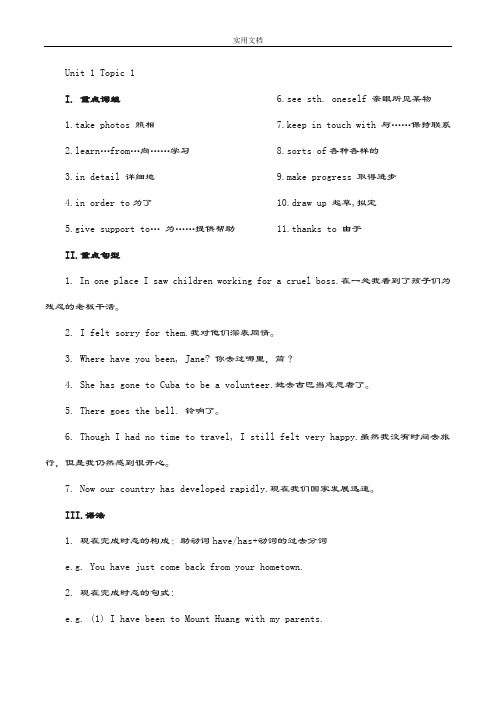
Unit 1 Topic 1I. 重点词组1.take photos 照相2.learn…from…向……学习3.in detail 详细地4.in order to为了5.give support to…为……提供帮助6.see sth. oneself 亲眼所见某物7.keep in touch with 与……保持联系8.sorts of各种各样的9.make progress 取得进步10.draw up 起草,拟定11.thanks to 由于II.重点句型1. In one place I saw children working for a cruel boss.在一处我看到了孩子们为残忍的老板干活。
2. I felt sorry for them.我对他们深表同情。
3. Where have you been, Jane? 你去过哪里,简?4. She has gone to Cuba to be a volunteer.她去古巴当志愿者了。
5. There goes the bell. 铃响了。
6. Though I had no time to travel, I still felt very happy.虽然我没有时间去旅行,但是我仍然感到很开心。
7. Now our country has developed rapidly.现在我们国家发展迅速。
III.语法1. 现在完成时态的构成:助动词have/has+动词的过去分词e.g. You have just come back from your hometown.2. 现在完成时态的句式:e.g. (1) I have been to Mount Huang with my parents.(2) I haven’t seen him for a long time.(3) Where have you been?(4) ——Have you ever cleaned a room? ——Yes, I have. / No, I haven’t.3. have/ has been与 have/has gone 的区别have/has been to sp.表示曾经到过某地—— have/has gone to sp.表示已经去了某地e.g. (1) I have been to Mount Huang with my parents. (2) She has gone to Cuba to be a volunteer.Unit 1 Topic 2I. 重点词组1. get lost 迷路2. each other 彼此3.at least 至少4take place发生5because of 因为6.be strict with sb. 对某人严格要求7.carry out 实行8.be short of 缺乏9.take measures to do sth.采取措施做某事10.be known as…作为……而著名11.work well in doing…在……方面起作用12.a couple of 一些13keep up with赶上,跟上II.重点句型1. Have you found him yet? 你已经找到他了吗?2. ——I really hate to go shopping. 我的确讨厌购物。
英语九年级上仁爱湘教版unit4topic2知识点汇编
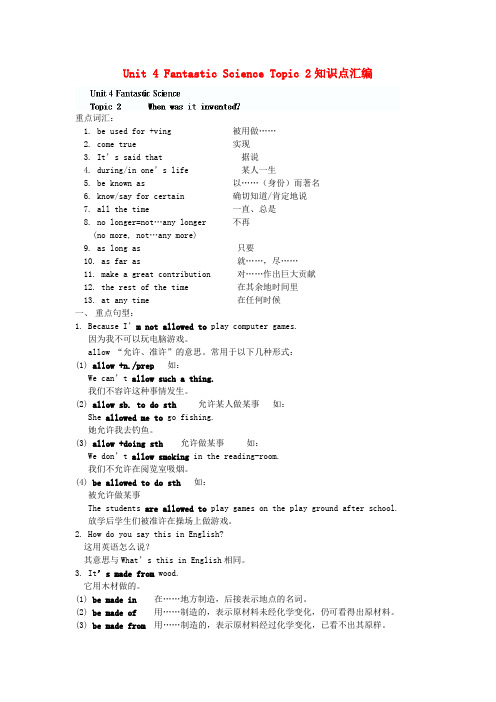
Unit 4 Fantastic Science Topic 2知识点汇编重点词汇:1. be used for +ving 被用做……2. come true 实现3. It’s said that 据说4. during/in one’s life 某人一生5. be known as 以……(身份)而著名6. know/say for certain 确切知道/肯定地说7. all the time 一直、总是8. no longer=not…any longer 不再(no more, not…any more)9. as long as 只要10. as far as 就……,尽……11. make a great contribution 对……作出巨大贡献12. the rest of the time 在其余地时间里13. at any time 在任何时候一、重点句型:1. Because I’m not allowed to play computer games.因为我不可以玩电脑游戏。
allow “允许、准许”的意思。
常用于以下几种形式:(1) allow +n./prep 如:We can’t allow such a thing.我们不容许这种事情发生。
(2) allow sb. to do sth 允许某人做某事如:She allowed me to go fishing.她允许我去钓鱼。
(3) allow +doing sth 允许做某事如:We don’t allow smoking in the reading-room.我们不允许在阅览室吸烟。
(4) be allowed to do sth如:被允许做某事The students are allowed to play games on the play ground after school.放学后学生们被准许在操场上做游戏。
英语初三上仁爱湘教版unit1.1单词解析
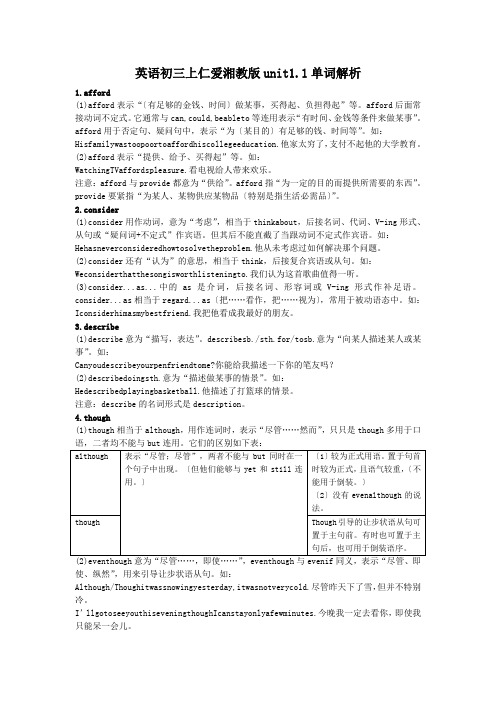
英语初三上仁爱湘教版unit1.1单词解析1.afford(1)afford表示“〔有足够的金钱、时间〕做某事,买得起、负担得起”等。
afford后面常接动词不定式。
它通常与can,could,beableto等连用表示“有时间、金钱等条件来做某事”。
afford用于否定句、疑问句中,表示“为〔某目的〕有足够的钱、时间等”。
如:Hisfamilywastoopoortoaffordhiscollegeeducation.他家太穷了,支付不起他的大学教育。
(2)afford表示“提供、给予、买得起”等。
如:WatchingTVaffordspleasure.看电视给人带来欢乐。
注意:afford与provide都意为“供给”。
afford指“为一定的目的而提供所需要的东西”。
provide要紧指“为某人、某物供应某物品〔特别是指生活必需品〕”。
2.consider(1)consider用作动词,意为“考虑”,相当于thinkabout,后接名词、代词、V-ing形式、从句或“疑问词+不定式”作宾语。
但其后不能直截了当跟动词不定式作宾语。
如:Hehasneverconsideredhowtosolvetheproblem.他从未考虑过如何解决那个问题。
(2)consider还有“认为”的意思,相当于think,后接复合宾语或从句。
如:Weconsiderthatthesongisworthlisteningto.我们认为这首歌曲值得一听。
(3)consider...as...中的as是介词,后接名词、形容词或V-ing形式作补足语。
consider...as相当于regard...as〔把……看作,把……视为〕,常用于被动语态中。
如:Iconsiderhimasmybestfriend.我把他看成我最好的朋友。
3.describe(1)describe意为“描写,表达”。
describesb./sth.for/tosb.意为“向某人描述某人或某事”。
仁爱版九年级上册英语知识点

仁爱版九年级上册英语知识点一、Unit 1 The Developing World。
1. 重点单词。
- describe:v. 描述;形容。
例如:Can you describe your new school?- provide:v. 提供;供应。
常用搭配:provide sb. with sth.或者provide sth. for sb.,如:The school provides us with a good learning environment.- remain:v. 保持;依然。
可作系动词,后接形容词等作表语,例如:He remained silent at the meeting.- increase:v. & n. 增加;增长。
increase by表示“增加了……”,increase to表示“增加到……”。
2. 重点短语。
- be short of:短缺;缺乏。
例如:The area is short of water.- so far:到目前为止,常与现在完成时连用。
如:So far, we have learned a lot in this semester.- take place:发生,通常指有计划、有安排地发生,没有被动语态。
例如:The sports meeting will take place next week.3. 重点句型。
- It is + adj. + for sb. to do sth.:对某人来说做某事是……的。
例如:It is important for us to protect the environment.- have/has been to与have/has gone to的区别:- have/has been to表示“去过某地(已经回来)”,例如:I have been to Beijing twice.- have/has gone to表示“去了某地(还没回来)”,例如:He has gone to Shanghai on business.二、Unit 2 Saving the Earth。
仁爱版九年级英语上册全册语法知识点

九年级(上)Unit 1Topic 1短语take photos 照相so…that 如此……以致于have /has been to 到过an English training school 一所英语培训学校在地take part in 参加 a disabled child 残疾儿童learn…from 从……学会around the world 全世界in the past 在过去in detail 详细地no chance 没机会make money 赚钱give support to 为某人提供帮助get a good education 得到好的教育have/has gone to 到过by the way 顺便问一下search the internet 上网used to be 去过曾经是with the development of China 随着中国的发展at sunrise 日出时grow cotton 种植棉花go hungry 变得很饿shout at 对…… 喊叫divide…into 把……分成send…to 把……送到……at that time 在那时feel satisfied with 对……满意be used to do sth. 被用来做…… more than 超过during the vacation 在假期期间living condition生活条件in recent years 在近几年make progress 取得进步live in present 立足现在dream about 展望未来happen to somebody/something ( 事情)发生在……身上,临到……头上happen to do something 碰巧thanks to 因为……,the capital of China中国首都stand for 代表host the 2008 Olympic Games 举办2008奥运会as well 也prepare for为…… 做准备taken place 发生with the help of 在……帮助下1.spend time (in) doing something 花费时间做某事2.see somebody doing something 看见某人做某事3.There goes the bell. 铃响了。
(完整)仁爱版英语九年级上册知识点总结汇总,文档.doc
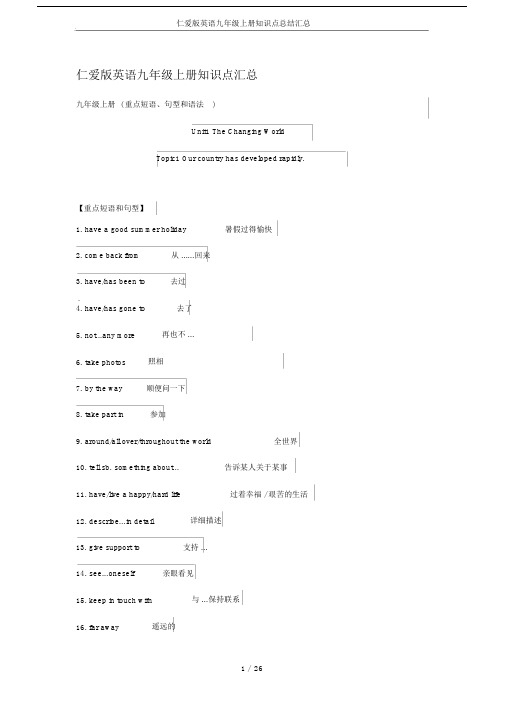
仁爱版英语九年级上册知识点总结汇总仁爱版英语九年级上册知识点汇总九年级上册 ( 重点短语、句型和语法)Unit1 The Changing WorldTopic1 Our country has developed rapidly.【重点短语和句型】1. have a good summer holiday 暑假过得愉快2. come back from 从 ......回来3. have/has been to 去过4. have/has gone to 去了5. not...any more 再也不 ...6. take photos 照相7. by the way 顺便问一下8. take part in 参加9. around/all over/throughout the world 全世界10. tell sb. something about... 告诉某人关于某事11. have/live a happy/hard life 过着幸福 / 艰苦的生活12. describe...in detail 详细描述13. give support to 支持 ...14. see...oneself 亲眼看见15. keep in touch with 与 ...保持联系16. far away 遥远的17. kinds/sorts of 各种各样的 ...18. not only...but also 不仅 ...而且 ...19. make progress 取得进步20. more than/over 多于21. develop/improve rapidly 迅速发展 / 改善22. tell sb. (not ) to do sth. 告诉某人(别)做某事23. ask sb. (not ) to do sth. 要求某人(别)做某事24. in order to do sth. 为了做某事25. have to do sth. 不得不做某事26. It's + 形容词 +for sb. to do sth. 对于某人来说做某事是...的27. why not do sth.=why don ’ t you为do什sth么不做某事28. succeed/be successful in doing sth. 成功地做某事29. dream about doing sth. 梦想做某事30. see/hear sb. do/doing sth. 看见 / 听见某人做 / 正在做某事【重点语法】现在完成时一. 现在完成时的基本结构肯定句:主语 +have/has+Ved (动词的过去分词)+其他否定句:主语 +have/has+not+Ved (动词的过去分词)+ 其他一般疑问句: Have/Has+主语+Ved (动词的过去分词)+ 其他特殊疑问句:特殊疑问词+一般疑问句语序(have/has+主语+过去分词+其他),把划线词去掉二. 现在完成时的用法1.现在完成时用来表示过去已经完成的动作对现在造成影响或后果。
英语九年级上仁爱湘教版unit1topic2知识点汇编

Unit 1 The Changing World Topic 2知识点汇编一、重点词汇(一)词形转换1. possible (反义词) impossible2. rise (过去分词) rose3. conclude (名词) conclusion4. medicine (形容词) medical5. difficult (名词) difficulty6. less (反义词) more7. excellent (近义词) great/ good 8. different (名词)difference9. come (过去式) came (过去分词) come 10. see (过去式) saw (过去分词) seen 11. peace (形容词) peaceful(二)重点短语1. get lost 走失;迷路2.hate to go shopping 讨厌去购物3.hear from sb.=receive/ get a letter from sb. 收到某人的来信4.be abroad 在国外5.at least 至少6.take place = happen 发生7.China’s one-child policy 中国的独生子女政策8.be strict with sb. 对某人要求严格9.the population of China 中国的人口10.live longer 活得更长11.medical care 医疗保健12.control the population 控制人口13.be known / famous as 以……而闻名14.work well in doing sth. 在做某事方面很有功效15.have a long way to go 有很长的路要走16.be short of 缺乏……17.one of the greatest problems 最大的问题之一18.be in trouble 陷入麻烦中/ 在困境中19.prefer boys to girls 重男轻女20.offer sb. a good education 提供某人良好的教育21.a couple of 一些 ;几个22.even though = even if 即使23.have a lot of pressure 有许多压力24.the differences between A and B A与B之间的区别一、重点句型1. We got lost and couldn’t find each other.我们走失了,互相找不到对方。
英语九年级上仁爱湘教版unit1topic3知识点汇编

Unit 1 The Changing World Topic 3知识点汇编一、重点词汇(一)词形转换1. homeless(名词) homelessness 2.fair (反义词) unfair2. excited (动词) excite3. disobey (反义词) obey4. succeed (名词) success (形容词) successful5. French (国家) France (公民) Frenchman(二)重点短语1.help homeless people 帮助无家可归的人2.in need 需要(食物和钱)3.decide on (doing ) sth. 决定(做)某事4.provide sb. with sth. 给某人提供某物e for a visit 来参观;来看一看6.be successful in (doing) sth. 成功地做了某事7.get/find jobs 获得/ 找到工作8.feel good about oneself 自我感觉良好9.take drugs 吸毒10.give sb. a good chance to do sth. 给某人做某事的一次好机会11.end the war 结束战争12.live a happy life 过着幸福的生活13.smile on one’s face 脸上露出笑容14.Project Hopes 希望工程15.at home and abroad 在国内外16.in poor areas 在贫困地区17.receive a good education 受到良好的教育二、重点句型1.It trains them so that they can find jobs again. 培训他们以便他们能再次找到工作。
2.I think it is important for these people to feel good about themselves.我认为对于这些人来说自我感觉良好是很重要的。
仁爱英语九年级上册语言知识点(湘教版)

Unit 1 The Changing WorldTopic 1 China has developed rapidly in recent years.五、重点语法(一)现在完成时:表示过去已经发生或已经完成的某一动作对现在造成的影响或结果。
即“过去的动作+ 现在的结果”,强调结果。
如:I have bought a new bike. (= I bought a new bike, and I have a new bike now.)我已经买了一辆新的自行车。
(强调我现在有了一辆新车。
)构成形式:助动词have / has + 动词的过去分词1.肯定句:I have seen the film. 我已经看过这部电影。
否定句:I haven’t seen the film. 我没看过这部电影。
一般疑问句:Have you seen the film? 你看过这部电影了吗?回答:Yes, I have.是的,我看过了。
No, I haven’t.不,我没看过。
特殊疑问句:What have you done?你已经做了什么?2.肯定句:He has finished the task. 他已经完成了任务。
否定句:He hasn’t finished the task. 他还没有完成任务。
一般疑问句:Has he finished the task? 他已经完成任务了吗?回答:Yes, he has.是的,他完成了。
No, he hasn’t.不,他没有完成。
特殊疑问句:What has he finished? 他完成了什么?(二)have/ has been to与have/ has gone tohave/ has been to + 某地,到过某地,说话时人已经回来了。
have /has gone to + 某地,说明去了某地,说话时人还没回来。
如:I have been to Beijing twice. 他去过北京两次。
英语初三上仁爱湘教版unit1重点词组句子语音点

英语初三上仁爱湘教版unit1重点词组句子语音点Topic1SectionA一、词汇短语1.ebackfrom3.feelsorryforsb.4.havebeen〔to〕。
5.havetakenpartin/havehelped/havespent/havedone/havelearnt6.inadisabledchildren’shome7.learnsth.fromsb.Eg:WelearnEnglishfromhimeveryday.8.notimetodosth.9.work/clean-----for---10.thewholeholiday二、重点句子1.Didyouhaveagoodsummerholiday?2.Howwasyourtrip?3.InoneplaceI saw children working foracruelboss.4.I feltsorryfor them.5.A:Wherehaveyoubeen,Jane?B:I havebeento MountHuangwithmyparents.5.A:Wherehashe/she/kangkangbeen?B:HehasbeentoanEnglishtrainingschooltoimprovehisEnglish.7、Theregoesthebell。
=Thebellisringing.8.A:Haveyou spent thewholeholiday working there?B:Yes,Ihave./No,Ihaven’tspend---onsth./spend---(in)doingsth.9.A:Haveyouever takenpartin anyactivitiesduringthissummerholiday?B:Yes,Ihave. No,Ihaven’t.(否定回答)Unit1Topic1SectionB一、词汇短语1.writeanarticleabout2.haveahardlife3.Inthepast4.indetail5.afford6.nochancetodosth.7.What’smore8.helpsupporttheirfamilies9.theChineseteenagers’lives10.hasgone(to)+比较:havebeen〔to〕11.intheopenair12.loseacompetition二、重点句子1.Couldyouplease----?2.Parentscouldn’t afford education for theirchildren.3.Mostchildren hadnochanceto gotoschool.4.Ourcountryhasdeveloped rapidly.。
仁爱英语九年级上册知识点Unit1—Unit2

仁爱英语九年级上册Unit1—Unit2主要知识点归纳【教材回归考点过关】1. have been to 表“曾经去过某地".注意区别:have gone to表“已经去某地了”。
如:I have been to Shanghai. (去过上海,已经回来)He has gone to Shanghai. (去上海了,不在此处)2。
have (no)time to do sth做某事(没)有时间Tom is busy helping his mother with housework, he has no time to play with you. 汤姆忙于帮助妈妈做家务,他没有时间和你玩3. What’s the population of…? 对人口提问的方式= how large is the population of…What’s the population of China? 中国的人口是多少?How large ix the population of China?注:人口不能用many/much 修饰,但是How many people 对多少人提问这样是可以的。
How many people are there in China?= What’s the population of China?4。
What do you mean by sth.? 某物是什么意思呢?= What’s the meaning of sth。
?= What does sth。
mean?What do you mean by the word? 这个单词是什么意思?= What’s the meaning of the word?= What does the word mean?5。
— How long have you been like this?你处于这样的状态多久了?— I have been like this since last month. 自从上个月以来我一直这样。
(完整版)仁爱英语九年级上册知识点归纳
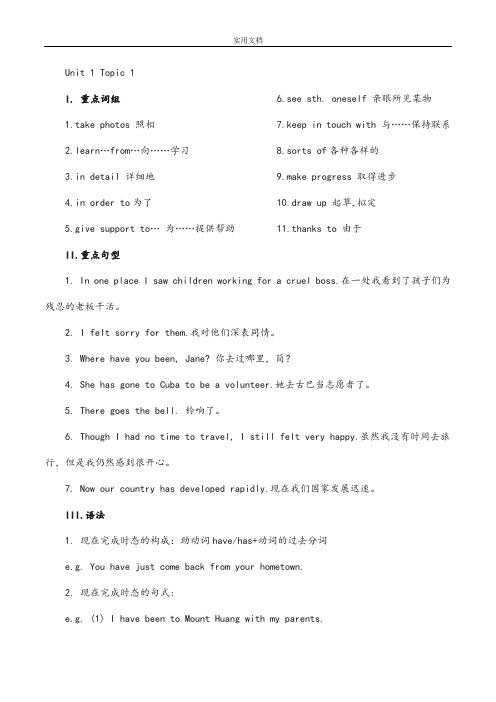
Unit 1 Topic 1I. 重点词组1.take photos 照相2.learn…from…向……学习3.in detail 详细地4.in order to为了5.give support to…为……提供帮助6.see sth. oneself 亲眼所见某物7.keep in touch with 与……保持联系8.sorts of各种各样的9.make progress 取得进步10.draw up 起草,拟定11.thanks to 由于II.重点句型1. In one place I saw children working for a cruel boss.在一处我看到了孩子们为残忍的老板干活。
2. I felt sorry for them.我对他们深表同情。
3. Where have you been, Jane? 你去过哪里,简?4. She has gone to Cuba to be a volunteer.她去古巴当志愿者了。
5. There goes the bell. 铃响了。
6. Though I had no time to travel, I still felt very happy.虽然我没有时间去旅行,但是我仍然感到很开心。
7. Now our country has developed rapidly.现在我们国家发展迅速。
III.语法1. 现在完成时态的构成:助动词have/has+动词的过去分词e.g. You have just come back from your hometown.2. 现在完成时态的句式:e.g. (1) I have been to Mount Huang with my parents.(2) I haven’t seen him for a long time.(3) Where have you been?(4) ——Have you ever cleaned a room? ——Yes, I have. / No, I haven’t.3. have/ has been与 have/has gone 的区别have/has been to sp.表示曾经到过某地—— have/has gone to sp.表示已经去了某地e.g. (1) I have been to Mount Huang with my parents. (2) She has gone to Cuba to be a volunteer.Unit 1 Topic 2I. 重点词组1. get lost 迷路2. each other 彼此3.at least 至少4take place发生5because of 因为6.be strict with sb. 对某人严格要求7.carry out 实行8.be short of 缺乏9.take measures to do sth.采取措施做某事10.be known as…作为……而著名11.work well in doing…在……方面起作用12.a couple of 一些13keep up with赶上,跟上II.重点句型1. Have you found him yet? 你已经找到他了吗?2. ——I really hate to go shopping. 我的确讨厌购物。
英语初三上仁爱湘教版全册词组

英语初三上仁爱湘教版全册词组Unit1Topic1seesb.doingsth.看见某人正在做某事be/feelsorryfor为…..感到难过have/hasbeento去过某地have/hasgoneto去某地了takephotos照相tellstories讲故事learn(sth.)fromsb.向某人学习have/liveahappy/hard/normallife过着幸福/艰难的/正常的生活indetail详细地havesthtodo有什么要做inordertodosth.为了做…helpsupportfamilies关心养家糊口givesupporttosb./givesb.Support为某人提供关心getagoodeducation受到良好的教育searchsw.forsb./sth..在某处搜查,查找search…forsth.…搜查,查找goabroad出国,athomeandabroad在国外withthedevelopmentof….随着……的进展haveabalanceddiet有均衡饮食what’smore.而且inthepast在过去atpresent现在seesth.oneself亲眼所见inthe1960s在二十世纪六十年代enjoyleisureactivities享受闲暇的活动keepintouchwith与..….保持联系since1978自从1978以来manysortsof=manykindsof许多种类的notonly…butalso…不但…../.而且makeprogress取得进步,取得进展happentosb./sth.发生在……身上makepreparationsfor为做预备drawup拟定,起草thanksto幸亏,由于Topic2getlost迷路,走失eachother互相atleast至少atthattime那时takeplace发生GreatchangeshavetakenplaceinChina.中国发生了巨大的变化. becauseof因为,由于one-childpolicy独生子女政策bestrictwithsb.对某人严格要求bestrictin/aboutsth.对某事严格要求anyother+单数名词increaseby+倍数或百分数“增加了……倍或百分之……”indevelopingcountries在进展中国家indevelopedcountries在发达国家Soitis.的确是,真的如此carryout实行,执行onefifth五分之一lesslivingspace较少的生活空间beshortof短缺sofar到目前为止takemeasurestodosth.采取措施做某事lessthan不到,少于acoupleof一些,几个befamousas…作为而出名workwellin(doing)sth.在某方面起作用25percentof百分之25的offersb.sth.提供某人某物keepupwith赶上,跟上Topic3thehomeless无家可归的人inneed在困难时,在贫困之中onceconj.一旦…就…,adv.一次,从前itis+adj.+forsbtodosth.对某人来说做…是decideon+n.\v-ing=decidetodosth决定要做某事providesb.withsth.=offersb.sth.提供给某人某物besucessfulindoingsth=succeedindoingsth成功完成某事feelgood感到愉快或有信心breakout爆发be/getusedto(doing)sth.适应(做)某事comeforavisit来参观rideaskateboard玩滑板gotoanamusementpark去游乐场seeafilmintheopenair看露天电影jumprope跳绳playtugofwar拔河playhide-and-seek捉谜藏returntoanormallife重新回到正常的生活obey/disobeytherules遵守\违反规那么takedrugs吸毒inthepast+时间在过去的……里inthepastsixteenyears在过去的16年里thepeopleathomeandabroad国内外的人们beusedforsth\doingsth被用来做某事Withthemoney用这些钱hearof听说hearfrom=receive/getaletterfrom收到来信仁爱九年级上册词组Unit2Unit2Topic1Therebe+sth./sb.+doingsth.有某人或某物正在做…since+点时间〔自从……以来〕,for+一段时间(长达…)pour…into…向…排放beharmfulto=doharmto对…有害produceterriblegas排放难闻的气体makesb.dosth.使某人做某事toomuchnoise太多噪音toomanyproblems太多问题managetodosth.设法做某事causehearingloss.=losehearing听力失聪,丧失听力thelookof………的外表notall…不是所有的都…becomedeaf变耳聋quiteafew/alot/bit许多,大量nobetterthan“同…〔几乎〕一样”,和…(几乎)一样坏duringtheclassroombreak在课间各种污染:air/water/soil/light/noise/litter/traffic/factory/plants/animalspollution produceranduserofcoal煤的生产者和消费者Topic2asaresult结果Thegovernmenthasdonesomethingusefultoprotecttheenvironment.政府差不多做了些有效的事去保护环境Noneofuslikespollution.我们中没人喜爱污染Whatshouldwedoasstudents?作为学生我们应该做什么leaverubbishhereandthere随处扔垃圾steponthegrass踩踏草坪spitinpublic在公共场所吐痰Nothingisdifficultifyousetyourmindtoit.世上无难事,只怕有心人payattentiontodoingsth注意做某事washaway冲走blowstrongly吹得猛烈dieout灭绝cutdown砍伐Alotofrichlandhaschangedintodesert,leavingonlysand.许多肥田变成沙漠,只剩下沙子stop/prevent/keepfromdoingsth阻止做runaway流走、跑走cutoffitswatersupply切断水供应Somethingswe’vedonearegood,whilesomearenotgoodfortheearth.我们所做的一些事对地球特别好,也有些不好beinbadhealth身体不好beindangerofdoingsth处于做某事的危险中plentyof许多cometorealize开始逐步认识BeachClean-upDay海滩清洁日either…or要么…要么Sincetherewillbealotofhardworktodotomorrow,makesureyougotobedearlytonight由于明天我们有许多事要做、确保你今晚早点睡觉makerules制定规那么keeptherules保持规那么follow/obeytherules遵守规那么daybyday日复一日Myfacehurt.=Thereissomethingwrongwithmyface.我的脸痛TheGreatGreenWall绿色长城toomanytrees太多树toomuchmoney太多钱atthesametime同时dealwith处理Topic3interviewsbaboutsth采访某人有关某事protecttheenvironment保护环境spreadthemessage宣传信息reducethewasteweproduce减少人为浪费usebothsidesofpaper使用纸的两面plasticbags塑料袋ratherthan而不notonly…butalso不但,而且throw…away扔掉collectwastepaperandsoftdrinkcans收集废纸和塑料瓶sothat以便It’skindofyoutodosth你做某事真是太好了should=oughtto=besupposedtodosth.应该agreenerperson一名绿色使者insteadof代替travelashortdistance短途旅行savemoneyandenergy省钱,省能量Easiersaidthandone.说比做容易Actionsspeaklouderthanwords.行大于言dealwith对付,处理nuclearenergy核能acidrain酸雨theMaglevTrain磁悬浮列车push…forward向前推MayIhaveyourattention,please?请〔大伙〕注意啦Ihavesth.importanttotellyou.我有重要的事要告诉大伙Pleasebeontime.请准时That’sall.我要说的就这些producepower/electricity发电It’sapitythat+句子遗憾的是beusedfordoingsth被用于做仁爱九年级上册Unit3Unit3Topic1米老鼠和唐老鸭的海报aposterofMickeyMouseandDonaldDuck 贴在墙上sticksthonthewall卡通人物cartooncharacters为……做预备bereadyforsth预备做某事bereadytodosth迫不及待做某事can’twaittodosth=can’thelpdoingsth. 有机会做某事haveachancetodosth练习做某事practicedoingsth能够做某事beabletodosth从现在起,开始fromnowon设法做某事tryone’sbesttodosth以后更加努力workmuchharderlateron和某人交流communicatewithsb和…相似besimilarto=bethesameas把…翻译成translate…into整理包packone’sbag出差onbusiness作为母语asmothertongue第二语言secondlanguage外语foreignlanguage官方语言theofficiallanguage(毫不)费力做某事have(no)trouble/difficulties(in)doingsth进行〔一次〕长谈havealongconversation,havelongconversations 与……相似bethesameas假如必要的话Ifnecessary向…求助ask…forhelp把翻译成translate…into…间或onceinawhile总的来说,通常ingeneral=usually随身带上某人/某物takesthwithsb.最新研究说明recentstudiesshow……的总数/数量thenumberof……许多anumberof被广泛使用bewidelyused参加一次国际性会议takepartinaninternationalconference上游泳课takeaswimmingcourse这是事实It’struethat+随着世界的进展withthedevelopmentoftheworld自从19世纪50年代以来sincethe1950s在二十世纪八十年代inthe1980s处于领先地位taketheleadingposition鼓舞某人做某事encouragesbtodosth在十九世纪inthenineteenthcentury号召callfor中国制造madeinChina把……看作,把…认为regard…as….也aswellasUnit3Topic2我听不懂你的话Ican’tfollowyou.请你说慢一点能够吗?Canyouspeakmoreslowly,please?澳式英语和英式英语一样吗? IsAustralianEnglishthesameasBritishEnglish?不确切,不完全Notexactly做得好Goodonya,mate=Welldone我明天要飞往迪斯尼乐园I’mflyingtoDisneylandtomorrow.祝你旅行愉快Haveagoodtrip!玩得快乐Enjoyyourself!一直,总是allthetime所以不Ofcoursenot取决于,视……而定,依靠dependon(doingsth)与…不同bedifferentfrom与…相同bethesameas……和……有不同差异havedifferencesbetween…and…成功做某事succeedindoingsth.使别人理解你makesb.understood(使动用法makesb.done)进行下一次的考试takethenextexam这单词的意思是什么?Whatdoesthiswordmean?=Whatdoyoumeanbythisword?=What’sthemeaningofthisword?去飞机场的路上onthewaytotheairport送别seesboff伸出putout如何了?What’sup?想搭车askforaride我要动身去……I’mleavingfor….我要走了I’mleaving打电话给某人callsb我叔叔明天会接见我们Myuncleismeetingustomorrow.你什么时候去迪斯尼乐园?WhenareyouleavingforDisneyland?我盼望可不能遇到什么困难IhopeIwon’thaveanydifficulty.不管何时你需要帮忙,发电子邮件或打电话给我Wheneveryouneedhelp,sendmeane-mailorcallme.我不明白I’mpuzzled.我只是开玩笑I’mjustkidding.至于某人/某物asforsb/sth一般来说,大体上generallyspeaking=ingeneral=generally起居室asittingroom=alivingroom填表格fillinaform=filloutaform乘地铁takethesubway=taketheunderground喜爱做某事enjoydoingsth.亲自做某事dosthinperson喜爱做某事befondofdoingsth.靠近beclosetosth=beneartosth众所周知asweknow发生comeabout〔强调缘故〕=happen〔强调偶然性〕被迫做某事beforcedtodosth在开始时inthebeginning慢慢地littlebylittle总之inaword你好吗?Howareyoudoing?写信给某人writetosb.写回信给某人writebacktosb.更糟糕的是evenworse向某人致以最美好的祝愿Bestwishestosb.Unit3Topic3使别人理解你makeyourselfunderstood陷入困境,特别尴尬getintotrouble和某人会谈haveconversationswithsb努力工作workhard在……努力,致力于workhardat….同意某人的看法agreewithsb.英语口语oral/spokenEnglish公开地,公然地,在公共场合inpublic犯困feelsleepy担心期末考beafraidofthefinaltest有时attimes=sometimes=onceinawhile向某人求助asksbforhelp=turntosbforhelp想要做某事feellikedoingsth=wanttodosth.=wouldliketodosth. 放弃giveup写日记keepadiary请再说一遍Ibegyourpardon.给某人一些关于…..建议givesbsomeadvice建议某人做某事advisesbtodosth在……方面特别差/弱beweakin不敢回答以下问题darenotanswerquestions担心做beafraidofdoingsth.担心犯错beafraidofmakingmistakes理解课文大意getthemainideaofthearticle深呼吸takeadeepbreath正确发音getthepronunciationright如何正确发音是我在学习英语方面的困难MydifficultyinlearningEnglishishowtogetthepronunciationright 做听力训练dosomelisteningpractice做……最正确时间thebesttimetodosth.开班会holdaclassmeeting和某人分享…sharesth.withsb.和你们分享我们小组的观点shareourgroup’sopinionswithyou回答replyto回答老师的问题replytotheteacher’squestions感谢你的倾听Thankyoufor〔your〕listening.做某事感到荣幸It’sanhonortodosth.尽可能经常asoftenaspossible就这些That’sall.记住去做某事remembertodosth.记住做过某事rememberdoingsth.坚持做某事insistondoingsth/keepondoingsth.起初atfirst笑某人laughatsb.造〔完整的〕句子make(complete)sentences为了做某事inordertodosth./inorderthat+句子写日记keepadiary最后,但同样重要的Lastbutnotleast仁爱九年级上册Unit4Unit4Topic1载人飞船amannedspaceship成功着陆landsuccessfully特别高心见到你Pleasedtomeetyou.做某事是我的荣幸It’sanhonortodosth.你现在感受怎么样?Howareyoufeelingnow?总得来说Ingeneral好好休息takegoodcareof在飞行期间duringtheflight做了体检havephysicalexaminations健康状况良好ingoodhealth制作录象makeavideo用录象机录下我们的活动经历makeavideoofourexperiences禁不住做某事can’thelpdoingsth反复地,再三地againandagain轮流做某事taketurnstodosth看到一个光明的以后seeabrightfuture在做某事方面取得进步makeprogressindoingsth.为感到自豪beproudof(doing)sth.=betheprideof(doing)sth. 为…感动bemovedby请你告诉我一些关于Couldyoutellmesomethingabout…..劝某人做某事advicesb.todosth.使〔叫〕某人做某事makesb.dosth.建议你更加努力学习使电脑更好的服务于我们的生活…adviceyoutostudyhardertomakecomputerserveourlivesbetter 期望某人做某事expectsb.todosth.计算机在工作和娱乐的许多方面差不多变得特别重要Computershavebecomeveryimportantinmanyareasofworkandplay. 毋庸质疑thereisnodoubtthat…在科技和商业领域intechnologyandbusiness在…的关心下withthehelpof…/withone’shelp使心脏正常跳keepheartsbeatingwell下定单或取消定单placeandcancelorders计算机使工作场所更安全,更好Computershavemadetheworkplacessaferandbetter.出现,产生comeintobeing多亏,由于Thanksto….做生意dobusiness玩游戏playgames看电影watchmovies购物doshopping在线聊天chatonline例如suchas/forexample/forinstance头痛getheadaches眼睛发炎getsoreeyes正确使用usesth.properly发送,接收邮件sendandreceiveanmail连接起来jointogether按照下面的指示做followthesedirections打开turnon把……和…..连接connet…to/with…连上英特网connecttotheInternet点击clickon输入typein在屏幕上onthescreen一组信息的目录alistofmessages做完某事finishdoingsth做实验doexperiments期待(做)某事lookforwardto(doing)sth日出日落thesunriseandsunset/Thesunrisesandsets.(句子)祝贺你congratulationstoyouUnit4Topic2Whenwasitdeveloped?被同意做某事beallowedtodosth对……有害bebadfor把……给某人看showsth.tosb.由……制成bemadeof/from/in用来发射卫星或宇宙飞船It’susedforlaunchingsatellitesorspaceships 被用来做…..beusedfordoingsth.它〔纸〕是用来写字的It’susedforwritingon.许多信息alotofinformation那个用英语如何说HowdoyousaythisinEnglish?=What’sthisinEnglish?由…开发/发明/研制bedevelopedby/beinventedby在日常生活里inone’sdailylife在某人一生期间duringone’slife据说/据报道It’ssaid/reportedthat+克隆羊theclonedsheep到目前为止,至今为止sofar如你所知asyouknow:人类humanbeings:生物livingthings:和…相似besimilarto和…一样thesameas:确切明白knowforcertain成为我们生活中的一部分bepartofourlives作为…而出名beknownas:对…感到惊异besurprisedatsth独立思考thinkforthemselves警告某人某事warnsbof/aboutsth警告某人不要做某事warnsbnottodo不再nolonger=not…anylonger把……看着/视为treast….as…为…做巨大贡献makeagreatcontributionto(doing)sth在医学领域inthemedicalfield对…有(不良)妨碍havesome(bad)effectson…发明findout对某人有用beusefultosb发挥特别好的作用workwellin只要aslongas实现cometrue大约5点钟around/aboutat5o’clock在我们的日常生活中inoureverydaylife一千多个发明morethanonethousandinventions在其余时间里duringtherestofthetime迷路lostone’sway=getlost=belost在森林中迷路lostone’swayinaforest被公认为一项伟大的发明beknownasagreatinvention总而言之inshort=inawordUnit4Topic3Wewillliveinspaceoneday.太好了/太令人兴奋Soundsgreat!/Thatsoundsexciting.乘宇宙飞船byspaceship有关太空生活aboutlifeinspace多么有味Whatfun!我可能不〔会〕。
仁爱版英语九年级上册知识点
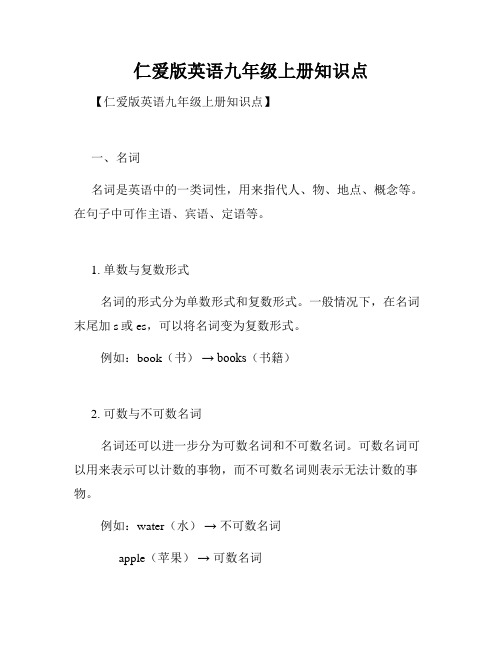
仁爱版英语九年级上册知识点【仁爱版英语九年级上册知识点】一、名词名词是英语中的一类词性,用来指代人、物、地点、概念等。
在句子中可作主语、宾语、定语等。
1. 单数与复数形式名词的形式分为单数形式和复数形式。
一般情况下,在名词末尾加s或es,可以将名词变为复数形式。
例如:book(书)→ books(书籍)2. 可数与不可数名词名词还可以进一步分为可数名词和不可数名词。
可数名词可以用来表示可以计数的事物,而不可数名词则表示无法计数的事物。
例如:water(水)→ 不可数名词apple(苹果)→ 可数名词二、动词动词是英语中的重要词性,用来表示行为、状态或存在的词。
1. 动词的时态动词的时态是用来表示动作发生的时间。
英语中常用的时态有一般现在时、一般过去时和一般将来时。
例如:I play basketball.(我打篮球。
)→ 一般现在时She danced last night.(她昨晚跳舞了。
)→ 一般过去时 We will go to the park tomorrow.(我们明天去公园。
)→ 一般将来时2. 动词的语态动词的语态主要分为主动语态和被动语态。
主动语态表示主语执行动作,而被动语态则表示主语接受动作。
例如:The cat chased the mouse.(猫追逐了老鼠。
)→ 主动语态The mouse was chased by the cat.(老鼠被猫追逐。
)→ 被动语态三、形容词形容词是用来描述名词的词性,用来表示事物的性质、特征、状态等。
1. 形容词的比较级与最高级形容词有比较级和最高级两种形式,用来表示两个或多个事物之间的比较关系。
例如:big(大)→ bigger(更大)→ biggest(最大)2. 形容词的位置形容词通常出现在名词之前,帮助补充和描述名词的特征。
例如:a beautiful flower(一朵美丽的花)四、副词副词是用来修饰动词、形容词、副词等的词性。
2020仁爱版湘教版九上英语重点短语和句子(背诵版)
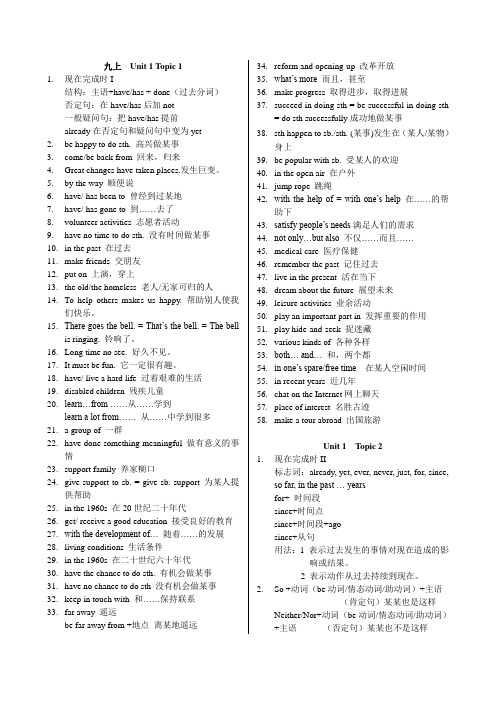
九上Unit 1 Topic 11.现在完成时I结构:主语+have/has + done(过去分词)否定句:在have/has后加not一般疑问句:把have/has提前already在否定句和疑问句中变为yet2.be happy to do sth. 高兴做某事e/be back from 回来,归来4.Great changes have taken places.发生巨变。
5.by the way 顺便说6.have/ has been to 曾经到过某地7.have/ has gone to 到……去了8.volunteer activities 志愿者活动9.have no time to do sth. 没有时间做某事10.in the past 在过去11.make friends 交朋友12.put on 上演,穿上13.the old/the homeless 老人/无家可归的人14.To help others makes us happy. 帮助别人使我们快乐。
15.There goes the bell. = That’s the bell. = The bellis ringing. 铃响了。
16.Long time no see. 好久不见。
17.It must be fun. 它一定很有趣。
18.have/ live a hard life 过着艰难的生活19.disabled children 残疾儿童20.learn…from ……从……学到learn a lot from…… 从……中学到很多21. a group of 一群22.have done something meaningful 做有意义的事情23.support family 养家糊口24.give support to sb. = give sb. support 为某人提供帮助25.in the 1960s 在20世纪二十年代26.get/ receive a good education 接受良好的教育27.with the development of… 随着……的发展28.living conditions 生活条件29.in the 1960s 在二十世纪六十年代30.have the chance to do sth. 有机会做某事31.have no chance to do sth 没有机会做某事32.keep in touch with 和……保持联系33.far away 遥远be far away from +地点离某地遥远34.reform and opening-up 改革开放35.what’s more 而且,甚至36.make progress 取得进步,取得进展37.succeed in doing sth = be successful in doing sth= do sth successfully成功地做某事38.sth happen to sb./sth. (某事)发生在(某人/某物)身上39.be popular with sb. 受某人的欢迎40.in the open air 在户外41.jump rope 跳绳42.with the help of = with one’s help 在……的帮助下43.satisfy people’s needs满足人们的需求44.not only…but also 不仅……而且……45.medical care 医疗保健46.remember the past 记住过去47.live in the present 活在当下48.dream about the future 展望未来49.leisure activities 业余活动50.play an important part in 发挥重要的作用51.play hide-and-seek 捉迷藏52.various kinds of 各种各样53.both… and… 和,两个都54.in one’s spare/free time 在某人空闲时间55.in recent years 近几年56.chat on the Internet网上聊天57.place of interest 名胜古迹58.make a tour abroad 出国旅游Unit 1 Topic 21.现在完成时II标志词:already, yet, ever, never, just, for, since,so far, in the past … yearsfor+ 时间段since+时间点since+时间段+agosince+从句用法:1 表示过去发生的事情对现在造成的影响或结果。
九年级英语(仁爱版)上册Unit 4语言点归纳
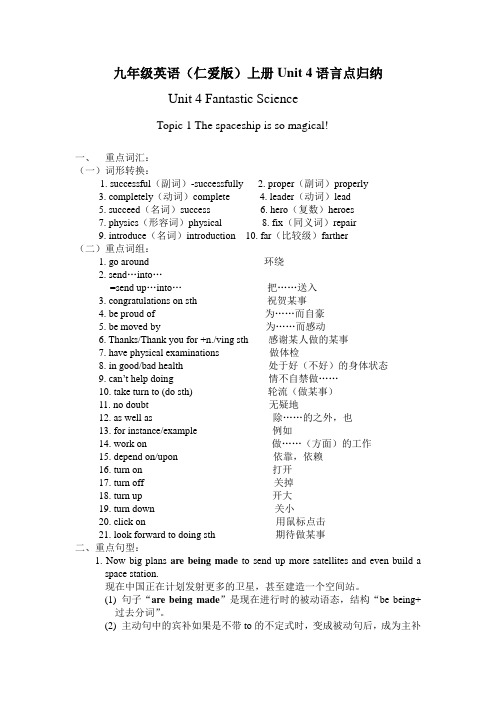
九年级英语(仁爱版)上册Unit 4语言点归纳Unit 4 Fantastic ScienceTopic 1 The spaceship is so magical!一、重点词汇:(一)词形转换:1. successful(副词)-successfully2. proper(副词)properly3. completely(动词)complete4. leader(动词)lead5. succeed(名词)success6. hero(复数)heroes7. physics(形容词)physical 8. fix(同义词)repair9. introduce(名词)introduction 10. far(比较级)farther(二)重点词组:1. go around 环绕2. send…into…=send up…into…把……送入3. congratulations on sth 祝贺某事4. be proud of 为……而自豪5. be moved by 为……而感动6. Thanks/Thank you for +n./ving sth 感谢某人做的某事7. have physical examinations 做体检8. in good/bad health 处于好(不好)的身体状态9. can’t help doing 情不自禁做……10. take turn to (do sth) 轮流(做某事)11. no doubt 无疑地12. as well as 除……的之外,也13. for instance/example 例如14. work on 做……(方面)的工作15. depend on/upon 依靠,依赖16. turn on 打开17. turn off 关掉18. turn up 开大19. turn down 关小20. click on 用鼠标点击21. look forward to doing sth 期待做某事二、重点句型:1. Now big plans are being made to send up more satellites and even build aspace station.现在中国正在计划发射更多的卫星,甚至建造一个空间站。
仁爱英语九年级上册知识点归纳
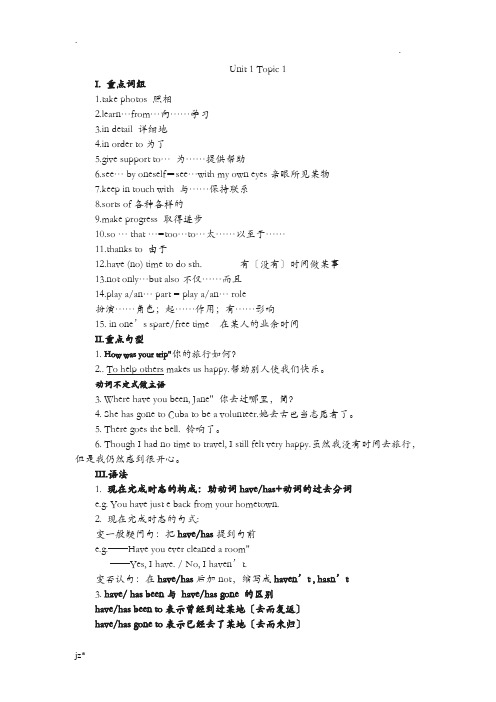
Unit 1 Topic 1I. 重点词组1.take photos 照相2.learn…from…向……学习3.in detail 详细地4.in order to为了5.give support to… 为……提供帮助6.see… by oneself=see…with my own eyes亲眼所见某物7.keep in touch with 与……保持联系8.sorts of各种各样的9.make progress 取得进步10.so … that …=too…to…太……以至于……11.thanks to 由于12.have (no) time to do sth. 有〔没有〕时间做某事13.not only…but also不仅……而且14.play a/an… part = play a/an… role扮演……角色;起……作用;有……影响15. in one’s spare/free time 在某人的业余时间II.重点句型1. How was your trip"你的旅行如何?2.. To help others makes us happy.帮助别人使我们快乐。
动词不定式做主语3. Where have you been, Jane" 你去过哪里,简?4. She has gone to Cuba to be a volunteer.她去古巴当志愿者了。
5. There goes the bell. 铃响了。
6. Though I had no time to travel, I still felt very happy.虽然我没有时间去旅行,但是我仍然感到很开心。
III.语法1. 现在完成时态的构成:助动词have/has+动词的过去分词e.g. You have just e back from your hometown.2. 现在完成时态的句式:变一般疑问句:把have/has提到句前e.g.——Have you ever cleaned a room"——Yes, I have. / No, I haven’t.变否认句:在have/has后加not,缩写成haven’t , hasn’t3. have/ has been与have/has gone 的区别have/has been to表示曾经到过某地〔去而复返〕have/has gone to表示已经去了某地〔去而未归〕e.g. (1) I have been to Mount Huang with my parents.(2) She has gone to Cuba to be a volunteer.Unit 1 Topic 2I. 重点词组1. get lost 迷路2. each other 彼此3.at least 至少4take place发生5because of 因为6.be strict with sb. 对某人严格要求7.carry out 实行8.be short of 缺乏9.take measures to do sth.采取措施做某事10.be known as… 作为……而著名11.work well in doing…在……方面起作用12.a couple of 一些13keep up with赶上,跟上13.So + be/情态动词/助动词+主语……也是14. Neither / Nor + be/情态动词/助动词+主语……也不是15.So +主语+ be/情态动词/助动词确实如此16. increase by 增加了……increase to 增加到……II.重点句型1. Have you found him yet" 你已经找到他了吗?2. ——I really hate to go shopping. 我确实讨厌购物。
- 1、下载文档前请自行甄别文档内容的完整性,平台不提供额外的编辑、内容补充、找答案等附加服务。
- 2、"仅部分预览"的文档,不可在线预览部分如存在完整性等问题,可反馈申请退款(可完整预览的文档不适用该条件!)。
- 3、如文档侵犯您的权益,请联系客服反馈,我们会尽快为您处理(人工客服工作时间:9:00-18:30)。
Unit 1 The Changing WorldTopic 1 China has developed rapidly in recent years.一、重点词汇(一)词形转换1. training (动词) train“训练”2. whole (同音词) hole3. tidy (近义词) clean4. develop (名词) development(形容词)developed“发达的”; developing“发展中的”5. rapid (副词) rapidly6. old (比较级) older; elder7. recent (副词) recently8. narrow (反义词) wide 9. title (近义词) subject(二)重点短语1.have a good summer holiday 过一个愉快的暑假e back from…从……回来3.work for …为……工作4.feel sorry for…对……深表同情5. a disabled children’s home 一家残疾儿童养育院6.the whole holiday 整个假期7.tell stories to kids 给小孩讲故事8.learn…from 从……当中学习9.feed a child 喂小孩10.do farm work 干农活11.go to summer classes 上暑期班12.write an article about…写一篇有关……的文章13.have a hard/ happy life 过着艰苦的/ 幸福的生活14.in the past/ future 在过去/ 在将来15.in detail 详细地16.at sunrise 在日出时17.have no chance to do sth. 没有机会做某事18.afford ( to do) sth 担负得起(做)某事19.give support to sb. 给某人帮助/支持20.get a good education 获得良好的教育21.search…for…为了……搜索……22.have little food to eat 吃不饱23.dress warmly 穿得暖24.with the development of…随着……的发展25.have a balanced diet 饮食均衡26.play musical instruments 演奏乐器27.sleep in the open air 在户外睡觉28.study/ go abroad 在国外学习/ 出国29.enter/ win/ lose a competition 参加/ 赢得/ 输掉比赛30.enjoy Beijing Opera 欣赏京剧ed to do sth. 过去常做某事32.at sunrise 在日出时33.go hungry 变饿了34.fall ill 得病/ 患病35.divide …into…把……分成……36.feel satisfied with…对……感到满足37.see …. oneself 亲眼看见……38.make progress 取得进步39.thanks to 多亏; 幸亏;由于40.stand for 代表41.with the help of…在……的帮助下42.draw up an outline 拟定提纲三、重点句型1.You have just come back from your hometown. 你刚刚从你的家乡返回。
2.There goes the bell.= The bell is ringing. 铃响了。
3.Have you spent the whole holiday working here? 你整个暑期都在那里工作吗?4.Is that so? 真是那样吗?5.Can you describe it in detai l? 你能详细地说说吗?6.Our job was to grow cotton.(作表语)我的工作是种植棉花。
7.I had to divide my money into two parts. 我不得不把钱分成两份。
8.He has seen the changes in Beijing himself.他亲眼目睹了北京的变化。
9. I think it is important to remember the past, live in the present and dream about the future. 我认为记住过去、立足现在、展望未来非常重要。
10.Thanks to / Because of the government’s efforts.由于政府的努力。
四、重点知识点1.Though I had no time to travel, I still felt very happy this holiday!尽管我没时间去旅游,但这个假期我仍然感到很愉快。
though 从属连词,用来引导让步状语从句,表“虽然;尽管”,不能与but连用。
如:Though he is poor, he is happy. = He is poor, but he is happy.尽管他很贫穷,但是他很快乐。
2.Could you please tell me something about Chinese teenagers? 请告诉我一些有关中国青少年的一些事情好吗?Could /Would you please (not) do sth?请(不)做某事好吗?如:Could you please turn down your radio? 请把收音机声音调低好吗?Would you please not play football here? 请不要在这儿踢球好吗?3.Parents couldn’t afford education for their children. 父母供不起孩子上学。
afford 常与can, could 或be able to 连用,尤其用于否定句或疑问句,表“负担得起(做)某事;抽得出(时间)”“(can’t/ couldn’t) afford (to do) sth.”如:We can’t afford (to buy ) this house because we don’t have enough money.我们买不这房了,因为我们没有足够的钱。
He felt he couldn’t afford any time to play football. 他觉得自己没有时间踢球了。
4.Our government gives support to poor families. 我们的政府能为贫困家庭提供帮助。
give support to sb.= give sb. support 为某人提供帮助/ 支持support作动词时表“供养;支持;支撑”,如:She had to support her family at the age of ten. 她十岁时就得养家。
His parents supported him in his decision.他的父母支持他的决定。
The two sticks support the tree. 两根木棍支撑着这棵树。
5.Why not go and search the Internet for some information?为什么不上网查找相关信息呢?search sp. for sth. 搜查某地寻找某物search sb. for sth. 搜身查找某物search for sth./ sb.= look for sth./ sb. 搜寻某物/ 某人;如:The villagers searched the woods for the lost children.村民们在树林里寻找失踪的孩子们。
The police searched the man for the stolen money. 警察搜那个男人的身,查找被偷的钱。
He is searching/ looking for his missing keys. 他在寻找他丢的钥匙。
6.I used to be a chilld laborer. 我以前是一个童工。
used to be/ do…过去曾是/常做……be used to do sth. = be used for doing sth. 被用来做某事be/ get used to (doing ) sth. 习惯于(做)某事;如:I used to be a Chinese teacher. 我过去曾是一名语文老师。
I used to swim in this river. 我过去常在这条河中游泳。
Knives are used to cut things.= knives are used for cutting things. 刀子被用砍东西。
We are used to getting up earlier now. 现在我们习惯于早起。
7.We often went hungry because the boss didn’t give us enough food to eat.我们经常挨饿,因为老板不给我们足够的食物。
在这里是系动词,表“变得…”,后跟形容词,构成系表结构.如:The food on the table went bad.桌面上的食物变坏了.8. One part was used to help support my family, to help send my elder brother to school. 一部分钱用来供养全家人,另一部分用来供哥哥上学.a)one part…the other (part) …一部分……另一部分……b)elder brother 哥哥elder 作形容词时, 是old的比较级, 一般表示家庭成员出生的顺序,在句中只能作定语,可与than连用;而older表年龄的比较,可与than连用. 如:His elder sister is two older than he. 他的姐姐比他大两岁.作名词时, 表“长者; 前辈; 祖先”, 如:Their customs were handed down by the elders.他们的风俗习惯是由他们的祖先传下来的.9. But China has developed rapidly in recent years.但是近年来,中国发展迅速.in recent years 表“近年来”,常与完成时连用. 如:She has learnt a lot of knowledge in recent years. 近年来,她学到了许多知识.10. China has made such rapid progress.中国已经取得如此迅速的进步。
